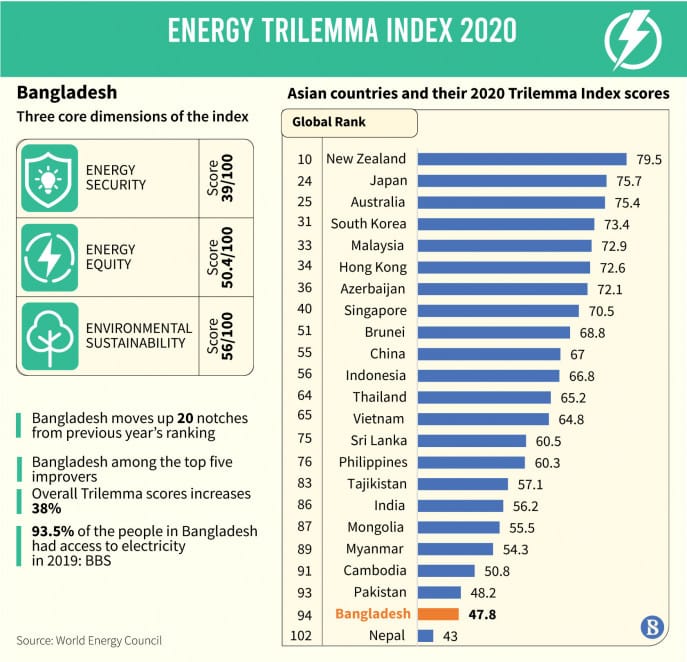Bangladesh has moved 20 notches up to rank 94th among 128 countries in terms of energy sustainability. Last year, the country ranked 114th.
However, the country is still hanging on to the second-worst position among Asian countries, with only its South Asian neighbour Nepal behind it.
The latest progress of the 128 countries on policy development and actual performance across three core dimensions – energy security, equity and environmental sustainability – was unveiled by the World Energy Council, a United Nations accredited body, in its 2020 World Energy Trilemma Index released on Thursday last.
This year, Bangladesh’s trilemma score stood at 47.8 out of 100.
Scores range from 0 to 100, with 100 indicating the best performer in terms of energy sustainability.
State Minister for Power, Energy and Mineral Resources Nasrul Hamid said, “The country’s performance has improved thanks to the relentless efforts of the Power Division. The division has been working to implement “Vision 2021″ envisioned by Prime Minister Sheikh Hasina.”
He, however, mentioned that the country’s ranking in the index should have gone up by some more notches.
Switzerland, Sweden and Denmark have emerged as the top three rated countries across all three trilemma dimensions in 2020, with scores of 84 and above.
The report also highlighted the position of Asian countries, where New Zealand (10th), Japan (24th) and Australia (25th) lead the table.
Only eight out of the 23 Asian countries made it to the list of top 50 countries, while only New Zealand was ranked among the global top 10.
Meanwhile, Nepal (102nd), Bangladesh (92nd), and Pakistan (93rd) were the worst performers in the region.
Mohammad Tamim, energy expert and professor at Bangladesh University of Engineering and Technology (BUET), said that Bangladesh witnessed a big jump in the index reflects the country’s outstanding performance.
“Undoubtedly this is a huge achievement. But if we are still at the bottom among the Asian countries, then it means that other Asian countries have performed better than us,” he said.
The report depicted that Asia has remained the largest energy importer in the world and that its energy security is expected to become even more challenging.
Among the three core dimensions, Bangladesh scored the lowest (39) in energy security.
Professor Tamim held import dependency as one of the major reasons behind the country’s poor score in energy security.
“Our position in energy security would improve if local energy production increased” he argued.
Currently, Bangladesh is heavily reliant on fossil fuels for producing electricity, which is mostly import-dependent.
The country currently imports 1,000 mmcf of gas out of its 3,172 mmcf daily demand.
Meanwhile, the country consumes 84 lakh tonnes of fuel oils – diesel, jet fuel and furnace oil – per annum for purposes of transportation, power generation, irrigation etc. And the entire amount is imported.
Additionally, the country also imports 1,160 megawatts of electricity from India.
The World Energy Council report highlighted that Bangladesh has seen a marked improvement in terms of access to electricity, largely because of the implementation of government policies.
According to the Bangladesh Bureau of Statistics (BBS), 93.5% of the people in the country had access to electricity in 2019, up from 90.1% in 2018.
The report also pointed out that the country’s improvement in energy affordability is greatly driven by its wider economic growth, and an increased GDP per capita.
Since 2000, Bangladesh has improved its trilemma scores by about 38%, ranking among the top five improvers in the 2020 Index.
Then again, the country has been featured consistently amongst the top ten energy equity improvers over each five-year window in the index.
The country scored 56 on environmental sustainability and 50.4 in energy equity this year.
The index also revealed a balance grade for each country which indicates how well a country manages the trade-offs of the trilemma with “A” being the best and “D” indicating the worst. Bangladesh received an overall grade of DDD.
Eight countries achieved the top AAA balance grade in the 2020 World Energy Trilemma Index, representing top quartile performance in every dimension.

